Coinciding with the Swedish Ambassador for the Ocean Helen Ågren’s visit to Thailand, UNEP (United Nations Environment Programme), the Coordinating Body on the Seas of East Asia (COBSEA) and the Government of Sweden launched a four-year project in Southeast Asia, a region in which many countries are major plastic polluters. Significant quantities of plastic end up as marine litter in the world’s oceans.
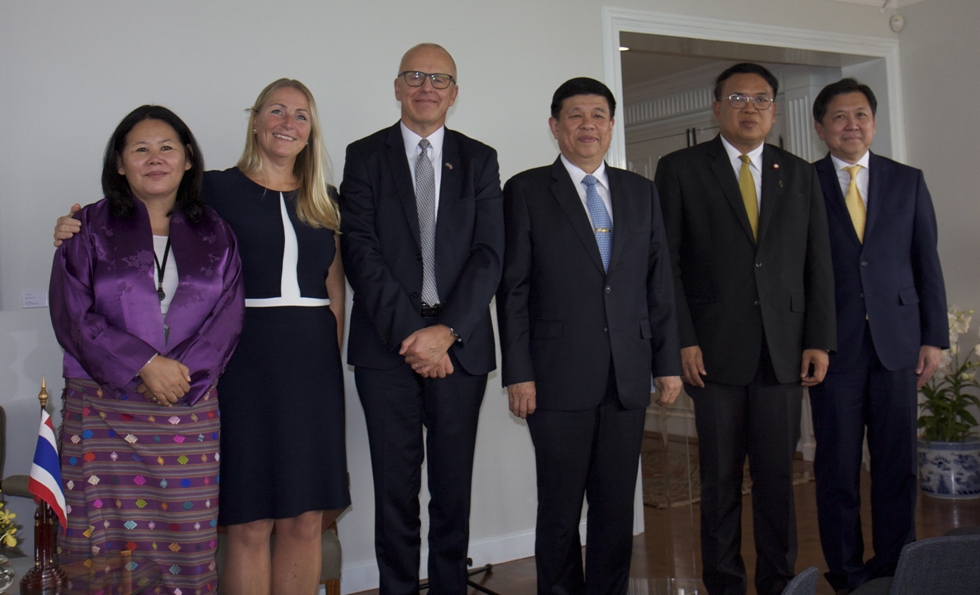
UNEP’s regional director for Asia and the Pacific, Dechen Tsering, explained that “60 percent of all plastic that ends up in our oceans comes from only six countries in Asia.”
Inexpensive plastic packaging and a take-away food culture further contribute to widespread single-use plastic use in the region. An additional challenge is the region’s limited waste management capacity, which contributes to mismanagement of over 75 percent of the region’s plastic waste.
The new project aims to reduce the use of difficult-to-recycle plastic, increase collection and recycling of high-value plastic such as PET, and boost public awareness on plastic pollution and support for improved plastic pollution policies. The project will also work to improve the region’s waste management systems.
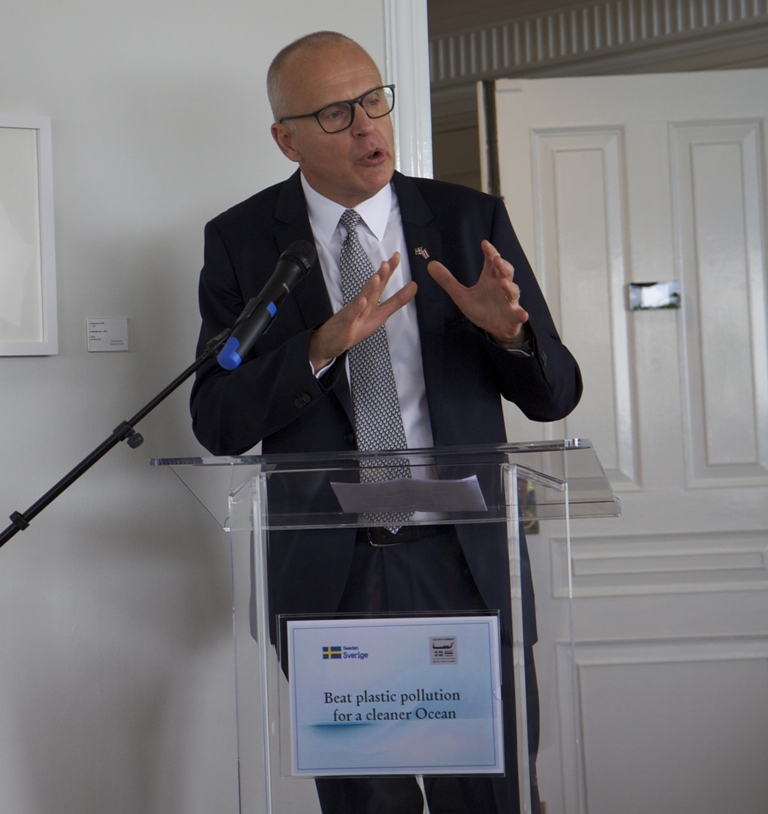
UN Environment and COBSEA will engage stakeholders throughout the plastic value chain, from plastic producers and waste managers to individuals in coastal communities who experience the impacts of plastic pollution.
Sweden’s Ambassador to Thailand, Staffan Herrström said: “The condition of the world’s oceans is critical and ocean governance is a high priority for Sweden. Through our global efforts and collaboration, we strive to improve governance, accelerate behavioural change to save the oceans and achieve SDG 14. As we celebrate 150 years of Thai-Swedish relations, I am pleased to see opportunities for our two countries to join forces in combating a serious global environmental challenge: the widespread plastic pollution in our oceans.”
Also the Embassy of Sweden hosted a well-visited and fruitful partner dialogue: ‘Beat plastic pollution for a cleaner Ocean’, with the Ocean Ambassador in attendance.
Helen Ågren, appointed since February 2018, has been engaged in environmental issues ever since being a student and then worked at Naturvårdsverket (Swedish Environmental Protection Agency) on research regarding waste and environmental adaptation of products – a very relevant area connecting to marine pollution.
“I have worked at Ministry of the Environment and Energy during many years on policies within green economy and sustainable production and the climate issue, reduction of pollution emissions and policy regarding that, and also climate adaptation. It was ahead of the UN’s ocean conference that I was tasked to coordinate the ocean work from the Swedish Ministry of Foreign Affairs. That was the start of my ocean engagement,” Helen Ågren told ScandAsia.
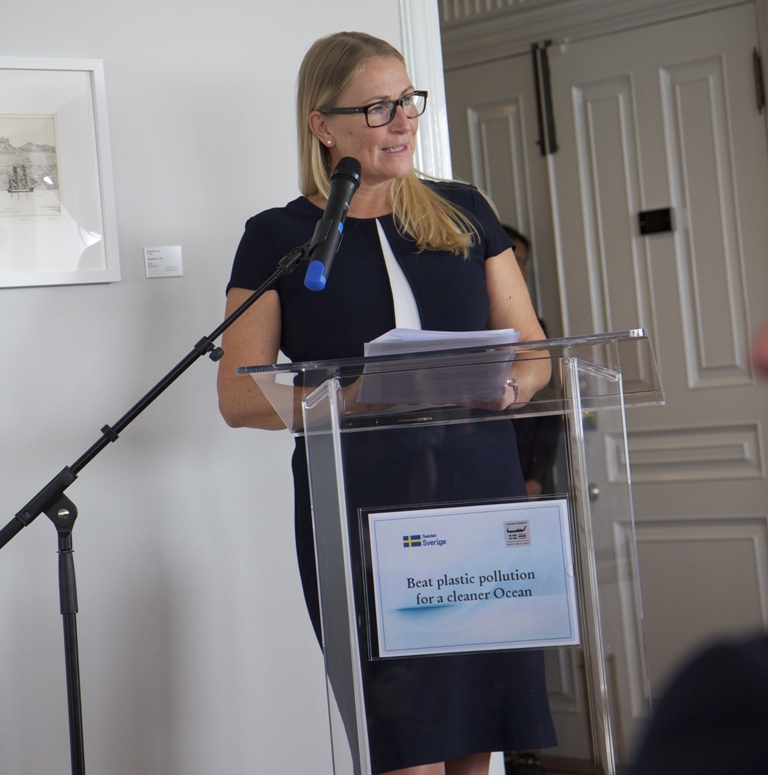
The new project with UNEP and COBSEA she said is about establishing sustainable flows of plastic in Asia. “The government has increased the funding for the global strategy regarding international development cooperation and focused more on the sea issue. The strategy for environment, climate, sustainable natural resources and sea has been given more funding.”
“To beat plastic pollution we have to work on many fronts: from material development and standardization in order to facilitate recycling, to increased consumer awareness and behaviour change, to policy development that incentivizes a circular economy, efficient use of resources and sustainable waste management systems,” the ocean minister said in a statement at the launch.
Know-how and solutions from Sweden could also be transferred to Southeast Asia, she believed. “Sweden has been dealing with waste disposal management and has developed that. And we are experts within several areas, especially within gas from waste.”
Sweden’s 34 “waste-to-energy” power plants. Instead of burning coal or gas, this power plant burns trash. And we recycle 89 per cent of all PET bottles.”
During 2017 1.85 billion cans and PET bottles where returned for reuse, which constitutes 85 per cent of all packages sold in the country during that year.
“So it is also about how to set up systems, and what steering instruments one can use to create incentives for the players to collect more and increase recycling and material recycling.”
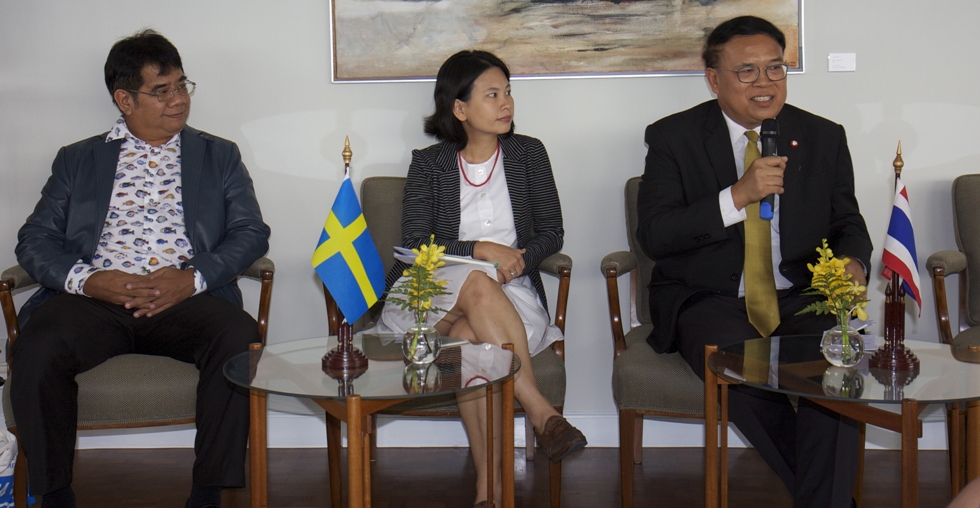
Commenting on the project Dechen Tsering Director, Asia and the Pacific Office, UNEP said that the idea is to look at how they can all turn the tide on plastics. “We look at the whole plastic economy in Southeast Asia. We work very closely with the intergovernmental mechanism [COBSEA]. This support will really foster partnerships; really important work is being done in most countries in terms of how they work with the marine environment but this programme will look at how to work with the plastic economy across governments in the region, and together with the private sector and academia. Aside advocacy, also really start looking at what infrastructure and what kind of regulations that are needed.”
Dechen Tsering also said that laws and agreements are not always practical so the idea for this project is foster this dialogue to come up with implementable policies.
Furthermore, there is already a regional action plan on marine litter developed quite some years ago. The idea with the support from Sweden is that they actually have resources to actually implement this regional action plan on marine litter. “So governments have been looking at this as an issue but suddenly they are realising the magnitude of the issue. And also, what is very important is that when we look at major sources of plastic and marine litter is that Thailand is a hotspot for it. So if we can get the rest of the countries working with Thailand we can address significant source of marine litter.”
Thailand, meanwhile, has established the 20-Year Pollution Management Strategy (which promotes SDGs, green economy, sustainable consumption and production as well as stakeholder engagement), the Pollution Management Plan 2017-2021, and the Master Plan on Waste Management 2016-2021. Furthermore, Thailand will launch a Plastic Debris Management Plan, comprising several approaches. Thailand is implementing the 3Rs (Reduce-Reuse-Recycle) strategy for plastic debris management, and is promoting education for relevant stakeholders in the field of plastic material and its substitute.
During Sweden’s partner dialogue Dr Wijarn Simachaya, Permanent Secretary of the Ministry of Natural Resources and Environment said that the National Environmental Board has already set up the sub-committee on the plastic litter management, including representatives from the private sector and also NGOs. “We are going to find the solutions and submit for consideration how to move forward in dealing with the plastic litter in our country.”
Marine plastic debris or litter is very important. Thailand and other Asean countries rank in the top ten where oceans are found to be most contaminated with plastic debris, including micro plastic. Also we have set up regional Asean co-operation in the efforts to reduce marine plastic debris,” he added.
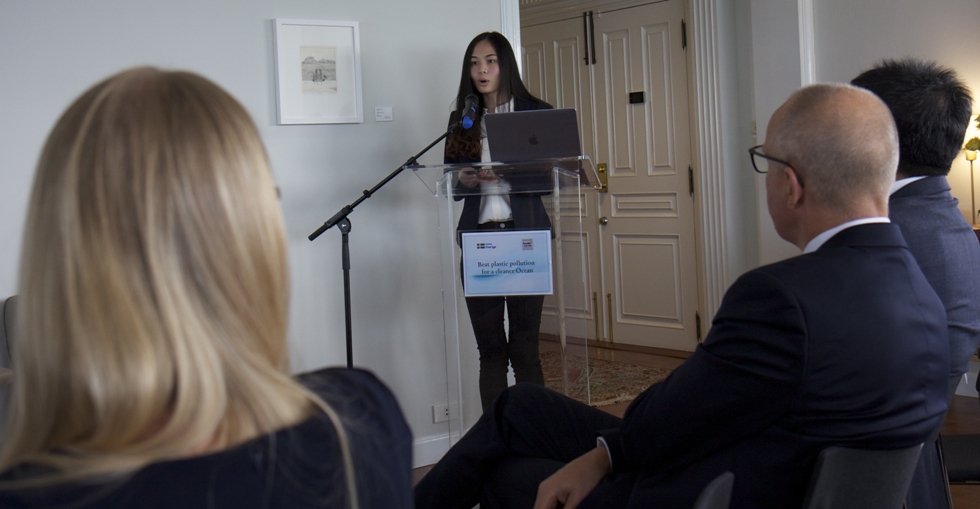
Ms Lejin Sun, a 17-year-old student in Bangkok also got to introduce the student-based NGO Grin Green International. This NGO reaches out to organisations to try to encourage them to reduce the use of single plastic waste.
“Our number one mission is to create a change in the Thai culture regarding its views on disposable plastics. Our NGO believes that in order to truly bring changes to – and reduction of plastic – we have to start with the culture,” said Lejin Sun.
“One of the main things and motivations is educational reform. We truly believe that to implement and change the culture of Thai people and the usage plastic we have to start young because we are the future of this generation and should start by educating the younger kids around us so that in the future we would not die because of the amount of plastic. So we are training a new generation of leaders,” she explained.
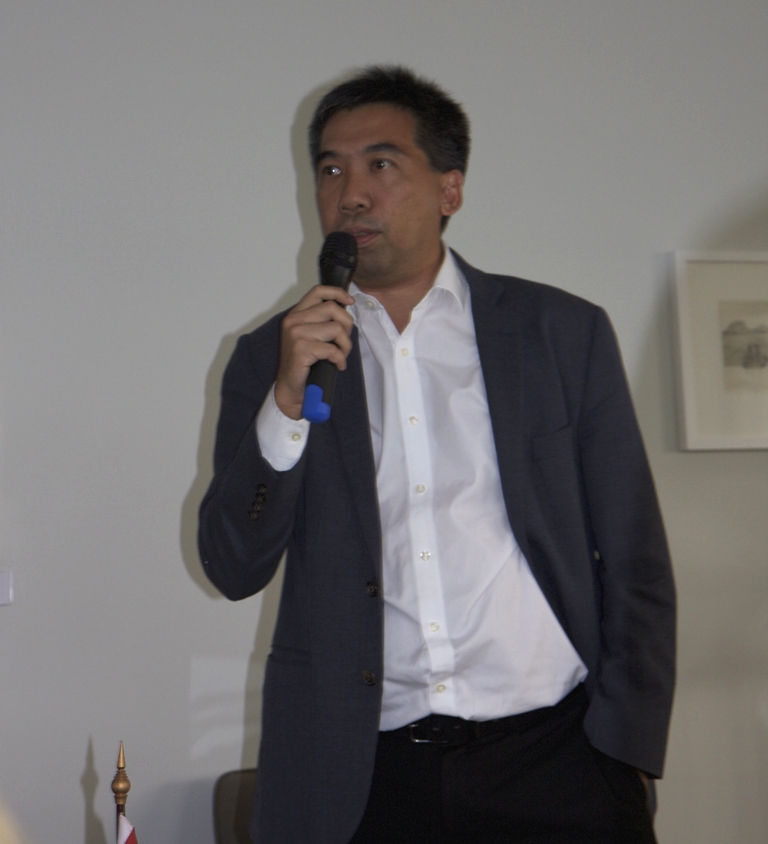 The partner dialogue also included a solutions session – with focus on plastic waste reduction. Dr. Suracha Udomsak, R&D Director and Emerging Business Director, Chemicals Business, SCG presented this Thai company’s efforts. SCG he said took a tough decision already in 2007, to stop producing plastic bags and instead stake on producing plastic pipes.
The partner dialogue also included a solutions session – with focus on plastic waste reduction. Dr. Suracha Udomsak, R&D Director and Emerging Business Director, Chemicals Business, SCG presented this Thai company’s efforts. SCG he said took a tough decision already in 2007, to stop producing plastic bags and instead stake on producing plastic pipes.
Earlier in 2018 SCG also arranged a global forum on Sustainability Development in Thailand, the ‘SD Symposium 2018’. It was held under the concept ‘Circular Economy: The future we create’, where all sectors were invited to collaborate in driving a circular economy by drawing inspirations from leading organizations success stories to create sustainability for natural resources. Attendees included leading global companies as well as the government sector, civil society, SMEs, start-ups, and local communities.
“From this year it has been very clear for us that at we are going to move ahead with the circular economy,” said Dr. Suracha.
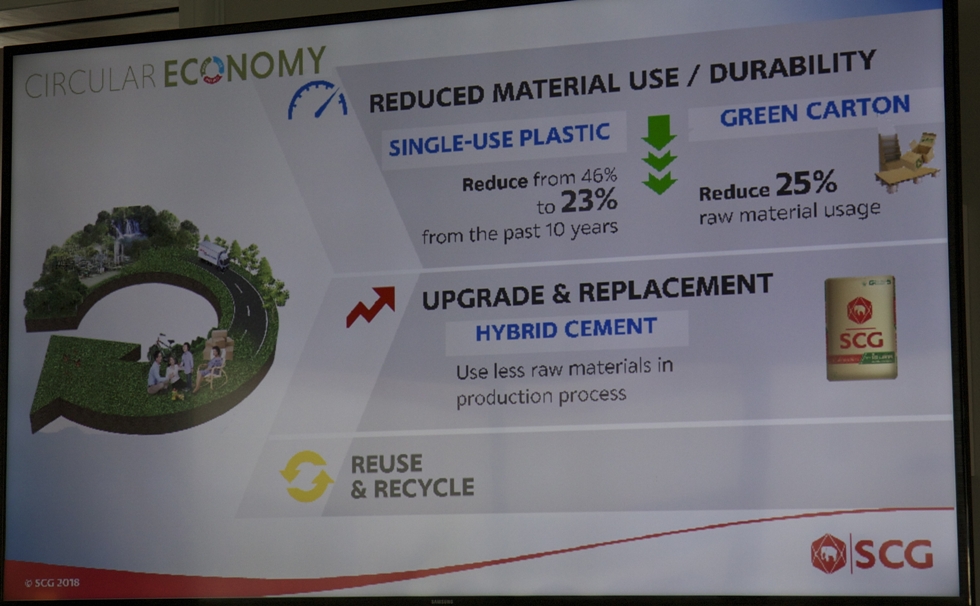
“For us the key message is to use the resource efficiently. In the past 20 years a lot of R&D on packaging was done to serve the convenience of people. I think now the pendulum is going to swing back, and people will use plastic more in terms of their competitive advantages. We try to use our strength as a conglomerate, for example we can send our waste from the chemical plant and use as raw material for pulp and paper industry. In pulp and paper one of the main raw materials is recycled paper so in Southeast Asia we have an extensive of network of people collecting waste paper for us.”
“This is a company effort in nutshell and we are very clear that we are happy to see our competitors doing this kind of stuff. A lot of these innovative things we cannot do by ourselves so we join hands.”
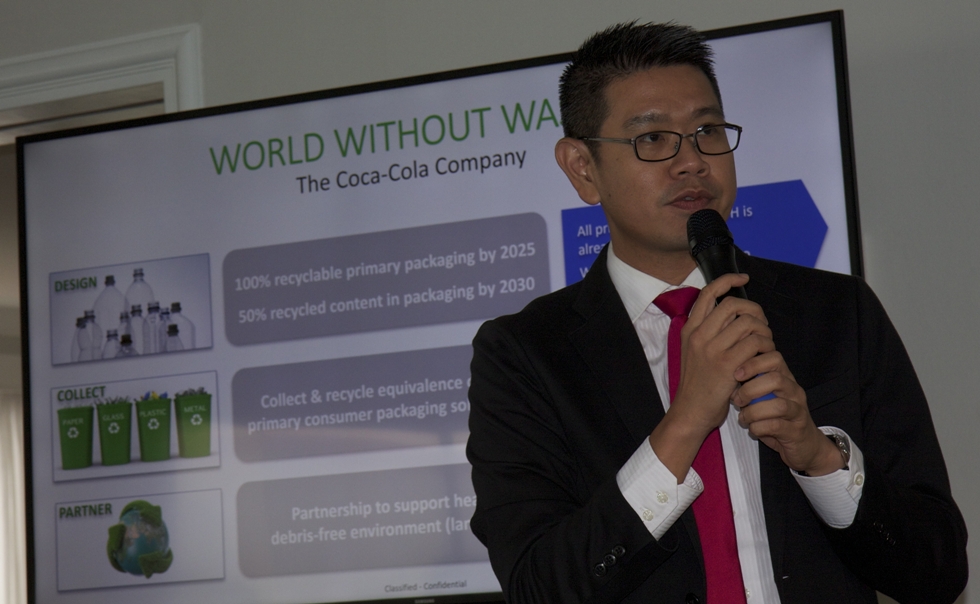
Nuntivat Thamhatai, Public Affairs, at Coca-Cola Thailand had also been invited to present Coca Cola’s efforts – very much a work in progress and not to shine as a role model yet.
“We know the plastic issue is a very challenging issue, and we do not know how we are going to end it but we know for sure that we need to end it, for a better world and for the next generation,” began Nuntivat.
Earlier in the year the Coca-Cola CEO made a global announcement for a ‘World Without Waste’, meaning the multinational’s packaging should no longer end up as waste and which included many commitments.
“We believe that our packaging can be designed in a new way so that it just doesn’t end up being just waste and a burden to society. In this area we made two commitments, first, we need to change packaging so that it becomes one hundred per cent recyclable by 2025. Second one is that we will try to introduce at least fifty per cent of recyclable content into our packaging. “
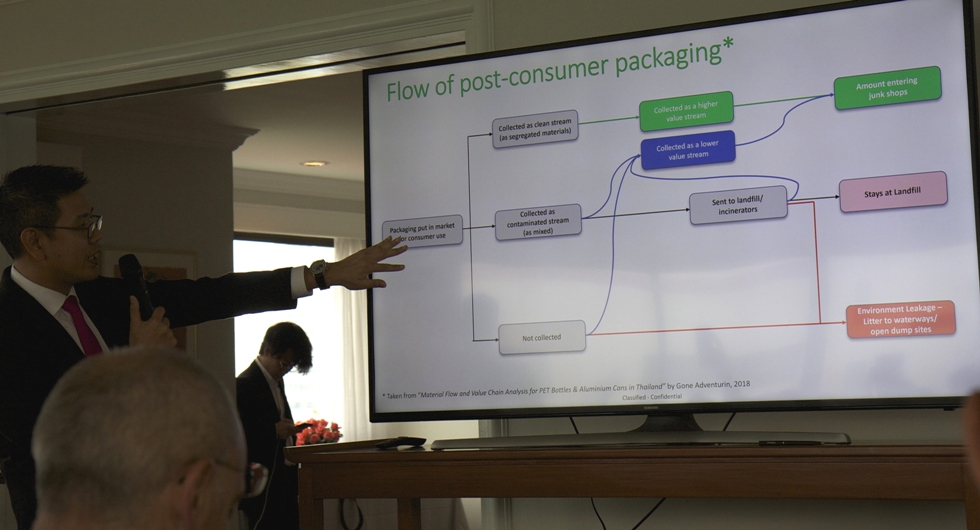
With their Thai drinking water brand he said the company already changed brand identity some five years ago and stopped using the cap plastic wrap, plus reduced the use of virgin plastic in bottles by 25 per cent.
However, a main legislative challenge remains in Thailand: “The Food and drug administration does not allow the use of recyclable plastic in food and beverage packaging. That prohibited us from really experimenting around introduction of recyclable PET [Polyethylene terephthalate] into our packaging. We have been engaging with them as well as the Thai Industrial Standard Institute to perhaps consider changing the law to accommodate this. Although right now PET is actually slightly more expensive than virgin PET but we would like to start introducing recyclable PET right away.”
The modern recycling technology is also tried and tested internationally, said Nuntivat, so it should not be an issue. “There is no reason why Thailand cannot follow other countries’ path. So hopefully in a not too distant future we’ll be able to change the regulation and start introducing recyclable content into our packaging.”
“This is a big challenge and no one single entity can really solve this issue alone. Collaboration is key and it is the same for this part of our commitment, We are committed to partnering with organisations, civil society, private, government in order to really get people be more aware and do their in terms of keeping the environment clean and debris-free, whether it is on land, sea and a lot of that has to do with communication and education,” he said.
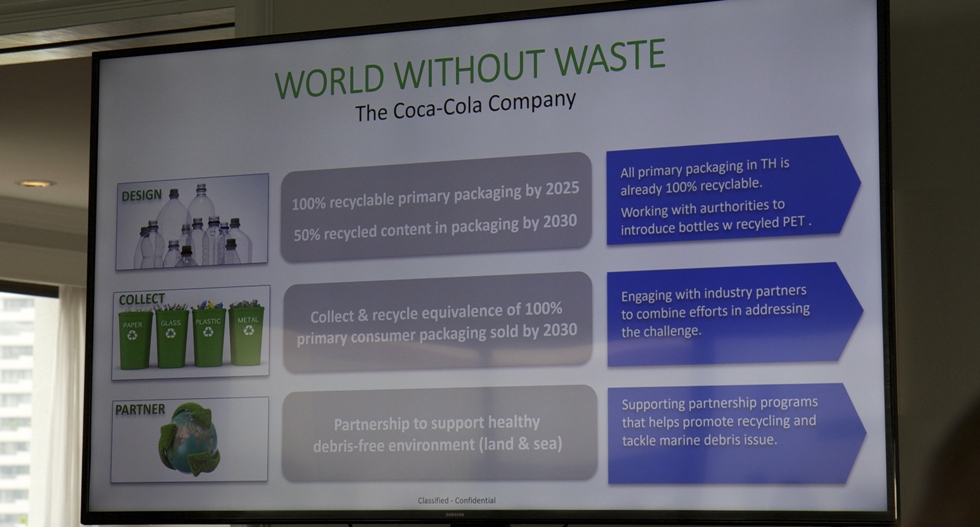
“We are talking to a lot of like-minded entities, especially private companies because we think that the private sector tends to move a bit faster, with perhaps a bit more resources and if they really are into the same purpose that have, meaning creating a World Without Waste then there should be a bit enough common ground for us to work together towards that vision.”
Coca-Cola Thailand is engaging with these people that share the same vision and already are doing a lot of good work on the ground to really connect a bit better and learn to be better from each other, pull resources together and achieve something that would be much more helpful than each and everyone doing it alone.
“Let us meet to try to set up this alliance and then move forward and what I actually found so far is that a lot of people are working on this issue. But each tends to have their focus areas. And not enough people have actually been talking to each other.”
“But a lot of that has to do with legislation as well and that is difficult. Most of us will agree that people right now are using a lot of plastic bags, because we have been doing that for decades. And we need to change that,” Nuntivat added.
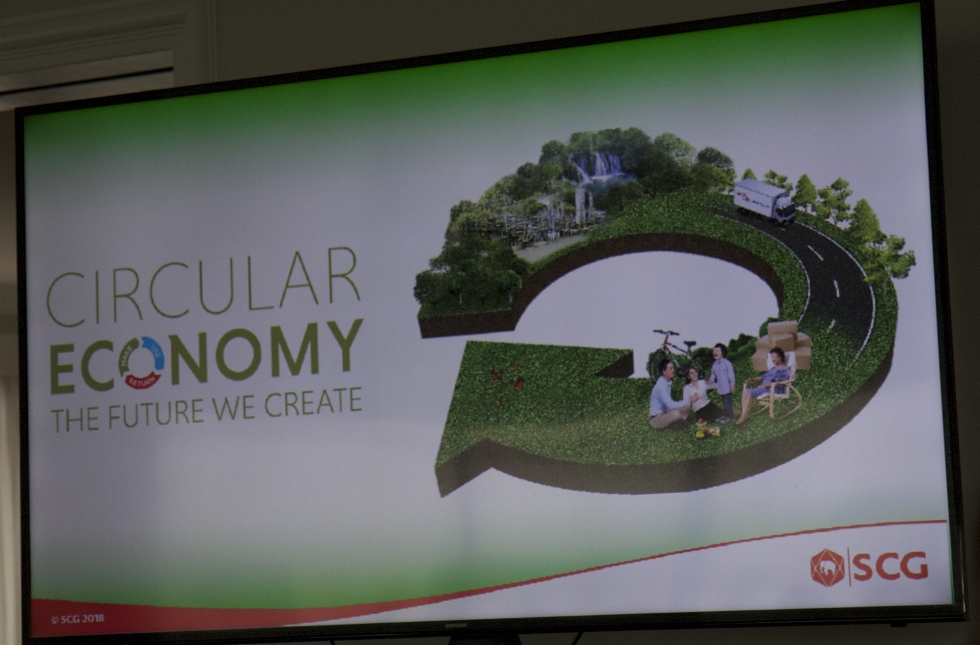
“People do not segregate. So if only people start doing that there will be more cans and PET bottles going into recycling and less going to landfill. So source segregation is probably the most impactful thing we can really do in order to really change the game. And you cannot expect the poor to really stop what they are doing. It takes government officials doing their job, enforcing the law, taking action to stop this littering.”
“Right now there is a lot of demand for recycle packaging, so if we can really push for effective source segregation a lot of that will go back to be circular economy already.”
Upcycling of waste into value-added products is another area. “Or if we can use more PET content in our recycling packaging that will probably help create more demand and hopefully more demand would mean a better price.”
Coca Cola Thailand also wants to stop waste from entering into the ocean. “We have seen some technology on how to stop it and we wonder why it has not been invested into already. I want to find out and perhaps we will partner with civil society and even technologies to stop that. So that is the area we are working on. It’s just the start of our journey but we try to do it in the most evidence-based fashion that we can in order to really ensure that what we are doing will move the needle.”


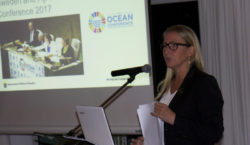

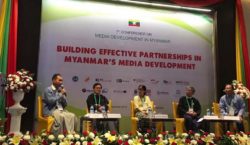
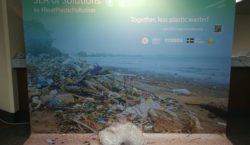
we want to work with you regarding the plastic waste management of the Himalayas as it has affected drastically in the negative environmental change to the High mountains of Nepal.